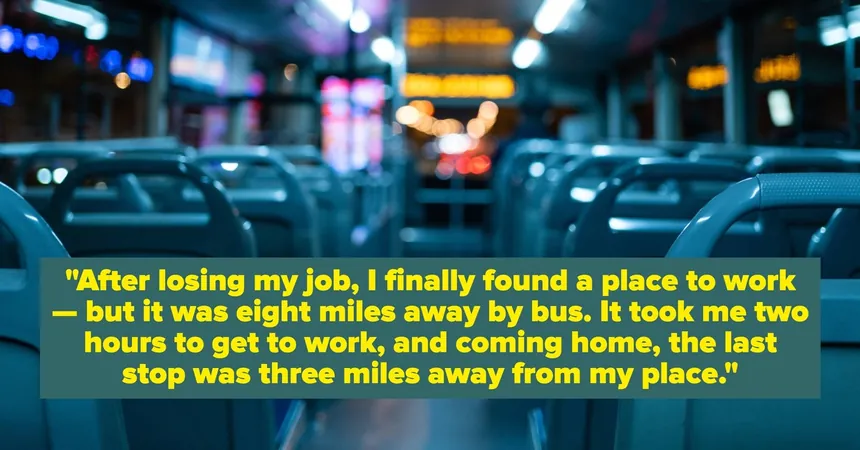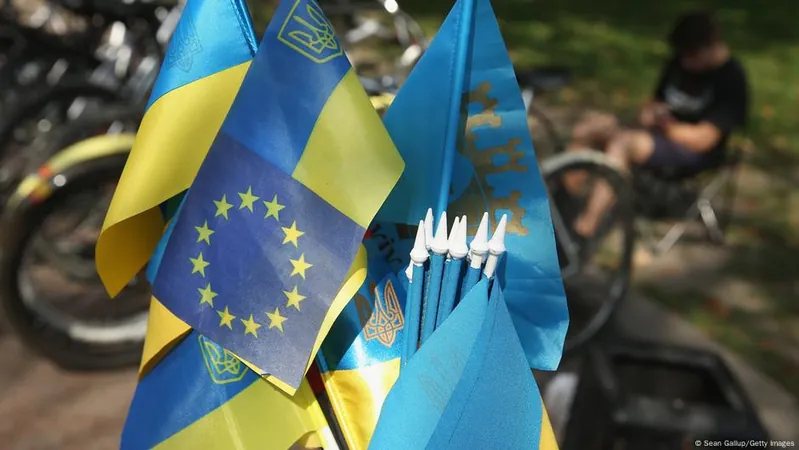
25 Shocking Ways Being Poor Costs You More Than You Think
2025-08-10
Author: Wei
The Hidden Expenses of Poverty
Being poor isn't just about having less cash; it's about navigating a world where everything costs more and takes longer. When wealthier individuals analyze financial choices, they often overlook the harsh realities that can make poverty a costly trap. A recent discussion by u/Live_Bird704 on Reddit highlighted these hidden "poverty taxes," exposing 25 instances where being poor proves to be much more expensive than anyone realizes.
1. Time is Money... Literally!
For those struggling financially, time becomes a luxury. One former low-income individual noted how their current financial stability saves them hours spent negotiating payment plans or hunting for discounts, illustrating how much time poverty consumes.
2. The Laundry Card Conundrum
Imagine budgeting $200 for laundry, only to find it lasts a mere six weeks. This is the reality for many who rely on laundromats, where costs add up quickly, forcing people to question if renting an Airbnb with laundry facilities might be more economical.
3. Public Transit Dilemma
Relying on public transportation means longer travel times compared to driving, which can significantly impact daily life and opportunities.
4. The Cycle of Cheap Goods
Constantly replacing low-quality items leads to higher long-term costs. Those without the means to invest in durable goods often find themselves stuck in a vicious cycle.
5. Energy Inefficiency
Living in poorly insulated homes can drive heating costs through the roof during winter months. The inability to afford upgrades results in higher utility bills, creating financial strain.
6. The Interest Trap
Not being able to pay for things upfront can lead to accumulating debt. With each repair or purchase, interest piles on, significantly raising the overall cost.
7. Missed Saving Opportunities
Without the luxury to buy items in advance, such as summer clothes during off-seasons, poor individuals often pay higher prices for immediate needs.
8. Health Implications
Small injuries go untreated due to the inability to take time off work, leading to chronic issues that become exponentially more costly to manage.
9. Grocery Costs Skyrocket
Without a car, convenient grocery shopping turns into a costly venture at local corner stores with inflated prices and limited selections.
10. Dental Health
Dental care often takes a backseat due to its expense, leading to severe long-term health issues.
11. The Autopay Tax
Those without a financial cushion often cannot afford the luxury of autopay, resorting to manual payments which lack discounts, turning it into an extra cost.
12. Bulk Buying Benefits
Without sufficient funds or space, the advantages of bulk buying are lost. Those who can’t afford extra groceries miss out on significant savings.
13. Insurance Premiums
Residing in poorer neighborhoods often results in higher insurance premiums, a hidden tax on those who can least afford it.
14. Home Maintenance Costs
Finances prevent many from making energy-efficient upgrades that could save money long-term, locking them into higher bills.
15. Community Isolation
Frequent relocations caused by rising rents disrupt community ties, leading to loneliness and social isolation.
16. Credit Card Inequity
Wealthy individuals enjoy rewards from credit cards, while those in poverty often lack access to such benefits.
17. Bank Fees
Many poor individuals face exorbitant banking fees, adding another layer of financial strain.
18. Lack of Banking Access
The scarcity of banking options in low-income areas forces many to rely on check-cashing services.
19. Stress Takes a Toll
Constant worry drains mental and physical health, leading to relational and emotional challenges.
20. Lingering Fear
The fear of returning to financial instability lingers long after one achieves some stability.
21. Environmental Justice Issues
Poorer communities often face greater environmental hazards, from toxic living conditions to pollution. These factors disproportionately harm children and families.
22. Interest Rates are Punitive
Lower-income individuals face higher interest rates, essentially penalizing them for their financial challenges.
23. Healthy Eating is Elusive
With limited budgets, healthy food becomes a rare treat, pushing many towards cheaper, less nutritious options.
24. Ticketing Challenges
Traffic tickets or fines can spiral into unmanageable debts for those living paycheck to paycheck.
25. The Burden of Stress
Constant financial strain diminishes problem-solving abilities and emotional resilience, effectively robbing individuals of their capacity to thrive.
These experiences depict a harsh reality where escaping poverty becomes a seemingly insurmountable challenge. Each decision carries hidden costs that those with financial stability may never encounter. Have you felt these impacts of poverty? What other hidden "poverty taxes" do you think we overlook? Share your experiences!



 Brasil (PT)
Brasil (PT)
 Canada (EN)
Canada (EN)
 Chile (ES)
Chile (ES)
 Česko (CS)
Česko (CS)
 대한민국 (KO)
대한민국 (KO)
 España (ES)
España (ES)
 France (FR)
France (FR)
 Hong Kong (EN)
Hong Kong (EN)
 Italia (IT)
Italia (IT)
 日本 (JA)
日本 (JA)
 Magyarország (HU)
Magyarország (HU)
 Norge (NO)
Norge (NO)
 Polska (PL)
Polska (PL)
 Schweiz (DE)
Schweiz (DE)
 Singapore (EN)
Singapore (EN)
 Sverige (SV)
Sverige (SV)
 Suomi (FI)
Suomi (FI)
 Türkiye (TR)
Türkiye (TR)
 الإمارات العربية المتحدة (AR)
الإمارات العربية المتحدة (AR)